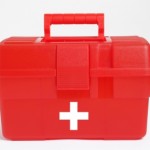

It pays to be well prepared at home to deal with minor health issues as soon as they arise. Dr. Oz has shared his five surprising essentials for your home, but do you have the basics? Here’s what a well-stocked medicine cabinet should contain to handle most maladies.
Antihistamines come in handy to reduce congestion and other symptoms related to colds and allergies. They can also be taken in the case of severe allergic reactions (e.g. bee stings) while waiting for emergency help to arrive.
Aspirin is a standard standby for adults for occasional pain relief, fever reduction and reducing inflammation in joints etc. (contraindicated if on a blood thinner or with a history of stomach ulcers). Chewing and swallowing an aspirin is often recommended to be taken at the first signs of a heart attack while waiting for emergency help to arrive.
Acetaminophen is great for short-term pain and fever reduction in children or for adults who can’t take aspirin. Be cautious about taking it while also taking other products such as cold medicines that contain the same ingredient because too much of the drug can cause serious side-effects.
Antibiotic ointment should be on hand to prevent infection in minor scrapes and cuts. Its use may also reduce scar formation.
Cortisone cream relieves itching and inflammation caused by rashes, irritation, bug bites and minor allergic reactions on the skin. Before using it on a child under two years old or if pregnant, consult your healthcare provider.
Anti-fungal cream can clear the occasional flare-up of athlete’s foot, ringworm, jock itch and nail fungus. More stubborn cases may require a prescription strength product.
Calamine lotion is a quick fix for pain and itching related to bug bites, rashes and poison ivy.
Antiseptics such as rubbing alcohol (isopropyl alcohol) can be used for cleaning cuts and scrapes (although soap and water is fine in most cases) as well as disinfecting tweezers, thermometers and other surfaces.
Tweezers are a necessity for removing splinters, ticks and other foreign bodies under the skin.
Adhesive bandages of various sizes should always be handy for minor cuts that need protection. These would include wounds that are likely to get dirty easily on areas of high use such as those on fingers and feet.
Gauze pads and surgical tape can assist with larger areas that need to be covered.
Elastic bandages can be used to wrap a sprained ankle or wrist for support or hold an ice pack in place.
Note: All over-the-counter medications are meant for temporary use only. Always follow the package instructions carefully and take heed of any printed warnings. Check with your pharmacist or healthcare provider if you have any questions or concerns.
Stocked with the above tools of the trade, you’ll be able to handle most minor health issues that come your way. Consider also creating a first aid kit containing theses items to take along on picnics, camping trips and children’s sporting events.
©DonnaCardillo. All rights reserved.


